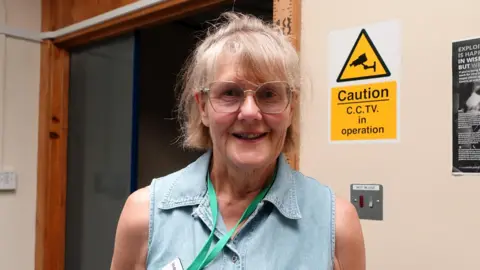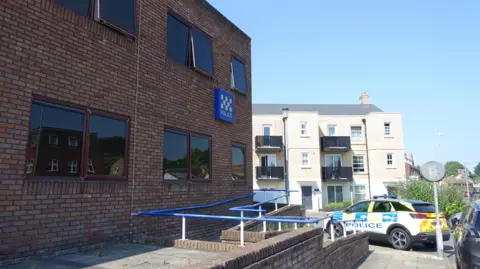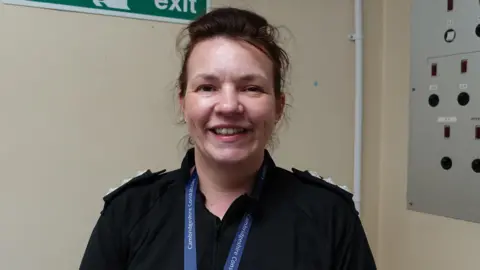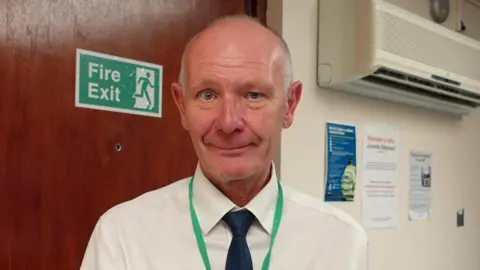The volunteers checking on people in custody
 BBC
BBCA woman who visited people being held in custody said she was "terrified" and "curious" the first time she spoke to somebody being detained in a cell, but had learnt a lot and would recommend the role.
Jo Treeby, 75, is one of about 20 independent custody visitors operating at police stations in Cambridgeshire – mainly Parkside in Cambridge and Thorpe Wood in Peterborough.
The volunteers work in pairs and make unannounced visits to police stations to check on the rights and wellbeing of people held in custody. Ms Treeby said she had successfully lobbied for room temperature changes and obtained glasses and bras for people being detained.
"Some people who are in detention are actually innocent, and it's horrid being locked up when you know you haven't done something," she said.
"Of course, that's not always the case. Sometimes it's very sad because you can see someone's been led astray."

Ms Treeby said the volunteers made a difference, including a time when a cell block had overheated.
"We said this isn't good enough, so at the end of that day, within a few hours, the cell block was closed down and the detainees were transferred.
"The staff were monitoring it, but we just pushed it a bit more quickly."
They also ensured there was a supply of reading glasses at police stations, equipment for nursing mothers, and bras for women if they needed to be searched or have a change of clothes.
Ms Treeby, who worked for the NHS for 40 years, recalled being "terrified I'd do something wrong [and] curious" on her first custody visit 13 years ago.
But she said she would recommend the job to others.
"My knowledge of policing in general has increased enormously and my respect for the police has gone up," she said.

Det Ch Insp Sarah Sleaford is responsible for custody criminal justice and investigation standards at Cambridgeshire Police.
She said the custody visitors were an important way for the police to build public trust and reassurance that her staff were doing a good job.
"If they identify something, they'll have a conversation there and then, and it might be through them they identify things we don't have.
"We might not see it because we're operational, running every day."
Det Ch Insp Sleaford said the scheme gave members of the public a window into custody, a process that takes place behind locked doors with access only for certain people, such as police officers and solicitors.
"It's probably more important that there are independent custody visitors to a space that's quite enclosed to the public," she added.

The volunteers usually carry out one or two visits a month, unannounced, which last between one and two hours.
They were required to keep information confidential, but do not have the same privilege that applies to a solicitor, so they could provide evidence in court of what a detainee has told them.
Each Police and Crime Commissioner (PCC) has a legal obligation to make arrangements for a custody visiting scheme to operate in their area.
Darryl Preston, the Cambridgeshire and Peterborough PCC, said he was "ever so grateful" for the work of the volunteers, but that they needed more people to sign up.
"We're looking for all kinds of people from all walks of life," he said.
He said it was important that the role was voluntary, rather than a paid job.
"It needs to be voluntary to maintain that independence," he said.
Follow East of England news on X, Instagram and Facebook: BBC Beds, Herts & Bucks, BBC Cambridgeshire, BBC Essex, BBC Norfolk, BBC Northamptonshire or BBC Suffolk.
